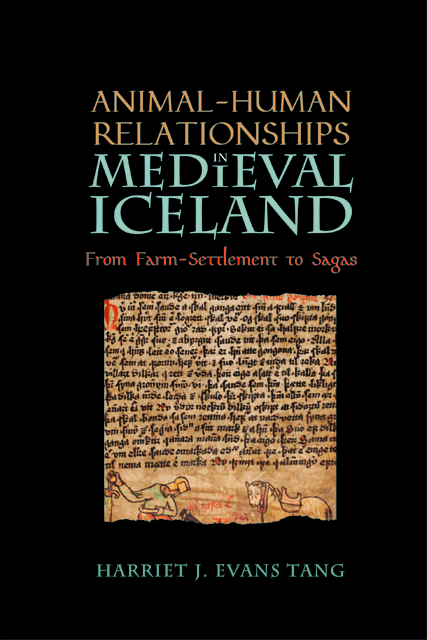Book contents
- Frontmatter
- Dedication
- Contents
- List of Illustrations
- Acknowledgements
- Note on Translations
- The Animal Acts …
- 1. An Animal-Human Settlement
- 2. Home, Sweet Home: Meeting Points on the Animal-Human Farm
- 3. The Animal-Human Community: Legal Tradition in Iceland
- 4. Fostering Relations: The Animal-Human Home in the Íslendingasögur
- 5. The Negative Animal: Absence, Precarity, and Danger
- … And the Man Responds
- Bibliography
- Index
- Nature and Environment in the Middle Ages
… And the Man Responds
Published online by Cambridge University Press: 11 January 2023
- Frontmatter
- Dedication
- Contents
- List of Illustrations
- Acknowledgements
- Note on Translations
- The Animal Acts …
- 1. An Animal-Human Settlement
- 2. Home, Sweet Home: Meeting Points on the Animal-Human Farm
- 3. The Animal-Human Community: Legal Tradition in Iceland
- 4. Fostering Relations: The Animal-Human Home in the Íslendingasögur
- 5. The Negative Animal: Absence, Precarity, and Danger
- … And the Man Responds
- Bibliography
- Index
- Nature and Environment in the Middle Ages
Summary
This book opened with a horse making himself known to a man, and the man responding. In this case, it was a specific example from a specific saga, but such an action and response, such an act of apparent interspecies understanding brought forth from learning, can rest as a metaphor for the ways in which animal-human relations are depicted in this book, and beyond. The animal-human interactions seen in the settlement narratives, organisation of farm sites, laws, and Íslendingasögur are reactions to the affective agency of animals in the early Icelandic world; our study and translation of them a further reaction to these co-creators.
This book examined the various representations of domestic animals and their interactions with humans in relation to the establishment and continuation of early Icelandic communities, focussed on the central space of the household-farm. It has done so through analysis and discussion of selected texts, and features of the built environment of Iceland, focussing on the organisation and demarcation of human and animal places in these sources, and the animal-human relations that would have informed, and been informed by, these constructions of cultural space. The findings of the chapters are as follows:
1. Settlement spaces matter
Both medieval texts and interpretations of archaeological material indicate that the settlement of Iceland involved close interactions between domestic animals, humans, and the environment, albeit to different degrees. In all cases, the locations and manifestation of settlement (the construction of the farmstead) are shown to be spaces of multispecies dwelling, and negotiation of complex animal-human relationships. The settlement narratives compiled in the thirteenth century are particularly pertinent to the aim of this book, given that they show an active interest in encouraging the role of animals in settlement processes, and as mediators between the new settlers and the land. It can be said then that part of the ideological framework of these settlement narratives was to develop ideas of a joint animal-human settlement, which seems likewise utilised in certain sagas focussed on specific families or individuals. The depiction of the management of, or cooperation with, animals as a process concurrent to the setting up of the farm would have had little relevance or interest to medieval society in Iceland unless these narratives were representative of a contemporary collective view of the importance of domestic animals in shaping the Icelandic community.
- Type
- Chapter
- Information
- Animal-Human Relationships in Medieval IcelandFrom Farm-Settlement to Sagas, pp. 209 - 214Publisher: Boydell & BrewerPrint publication year: 2022



